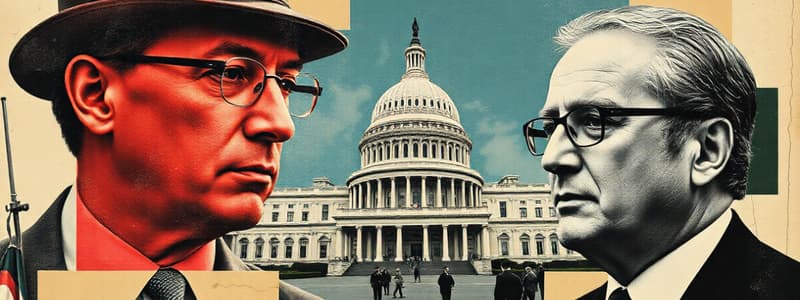Podcast
Questions and Answers
What is the primary focus of political theory?
What is the primary focus of political theory?
- Systematic study of government structures
- Quantitative analysis of political behavior
- Public policy development and evaluation
- Fundamental questions about justice and power (correct)
Which of the following themes is NOT central to political theory?
Which of the following themes is NOT central to political theory?
- Individual rights and collective responsibilities
- Economic growth and development (correct)
- Justice and fairness
- Legitimacy of the state
Which political theory emphasizes individual rights and limited government?
Which political theory emphasizes individual rights and limited government?
- Liberalism (correct)
- Feminist theory
- Conservatism
- Socialism
Who is considered a key figure in political theory?
Who is considered a key figure in political theory?
Critical race theory primarily examines which aspect of society?
Critical race theory primarily examines which aspect of society?
What does political theory encourage in relation to political action?
What does political theory encourage in relation to political action?
Which school of thought critiques gender inequalities in political life?
Which school of thought critiques gender inequalities in political life?
Which of the following does NOT belong to the core concepts of political science?
Which of the following does NOT belong to the core concepts of political science?
Flashcards
Political Science
Political Science
Systematic study of politics, government, power, and policy.
Political Theory
Political Theory
Branch of political science that explores fundamental concepts like justice, power, and the good society.
Justice
Justice
Fairness in how individuals are treated and resources are allocated.
State
State
Signup and view all the flashcards
Power
Power
Signup and view all the flashcards
Legitimacy
Legitimacy
Signup and view all the flashcards
Liberalism
Liberalism
Signup and view all the flashcards
Conservatism
Conservatism
Signup and view all the flashcards
Study Notes
Political Science
- Political science is the systematic study of politics, encompassing government, power, and policy.
- Key subfields include comparative politics, international relations, political theory, and public administration.
- It employs various methodologies, including quantitative analysis, qualitative research, and historical analysis, to understand political phenomena.
- Core concepts include state, sovereignty, power, legitimacy, democracy, freedom, and justice.
- Political science aims to describe, explain, and predict political behavior and outcomes.
- It seeks to understand the interactions and conflicts between individuals, groups, and states.
- The discipline is crucial for understanding and engaging in public life.
- Political science research contributes to the development of public policy and the evaluation of governmental institutions.
Political Theory
- Political theory is a branch of political science that examines fundamental questions about justice, power, rights, and the good society.
- It delves into the nature of political concepts and institutions, evaluating their merits and limitations.
- It often considers how these concepts and institutions impact the lives of individuals and societies.
- Key figures in political theory include Plato, Aristotle, Hobbes, Locke, Rousseau, Marx, and Mill, among others.
- Central themes in political theory include:
- Concepts of justice and fairness.
- The nature and legitimacy of the state.
- The relationship between individual rights and collective responsibilities.
- The role and limitations of power.
- The concept of the ideal society.
- Different schools of thought within political theory offer varied perspectives:
- Liberalism emphasizes individual rights, freedoms, and limited government.
- Conservatism prioritizes tradition, community, and order.
- Socialism advocates for collective ownership and social equality.
- Feminist theory critiques gender inequalities and seeks to promote gender equity in political life.
- Critical race theory examines systemic racism and racial injustice.
- Political theory engages with contemporary issues, providing critical perspectives on problems and solutions.
- The field informs political debates and encourages critical reflection on the ethical dimensions of political action.
- It's intertwined with other disciplines like ethics, philosophy, and sociology.
- Political theory provides frameworks for analyzing political phenomena, events, policies, and other situations occurring in society.
Studying That Suits You
Use AI to generate personalized quizzes and flashcards to suit your learning preferences.




